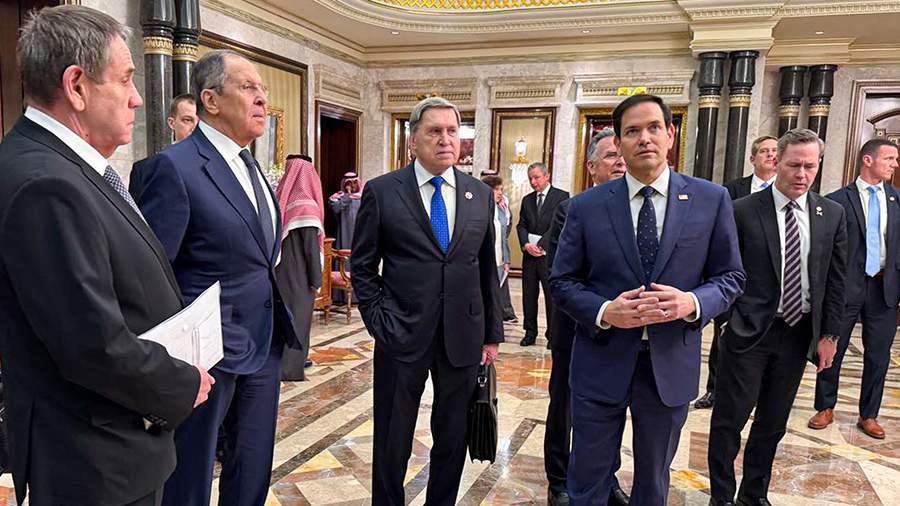Helpless Europe and Zelensky is out of business. What the media say

The talks between the USA and Russia in Saudi Arabia showed that the peacekeeping process will take place without Ukraine's participation. Europe concludes that it needs to build its own defense and adjust to Washington's changing foreign policy. What the world media write about the mood in the EU - in Izvestia's digest.
Bloomberg: Zelensky excluded from negotiations on the fate of Ukraine
Ukrainian President Volodymyr Zelensky (his term of office expired on May 20) canceled his visit to Saudi Arabia after he was excluded from the talks between the U.S. and Russia on the future of his country. His trip was to follow a meeting between U.S. Secretary of State Marco Rubio and Russian Foreign Minister Sergey Lavrov.
Bloomberg
That left Zelensky out of the picture. The Ukrainian president was in Turkey on Tuesday as part of a regional tour to drum up international support. He was scheduled to travel to Saudi Arabia, hoping to get a report on the U.S.-Russia talks from Crown Prince Mohammed bin Salman. Late Tuesday night, he changed his mind about going.
The fact that Zelensky is asking for a mediator for talks that could affect his country's survival underscores a dramatic change in U.S. diplomacy. Prince Mohammed wanted the Ukrainian leader to be represented at the talks, but the Americans and Russians insisted they wanted to meet without the Ukrainians.
Financial Times: Europe is incapable of defending itself without U.S. help
European officials are realizing that the US no longer wants to be the main guarantor of security for Ukraine or the continent as a whole. Europe faces a severe shortage of long-range munitions and massive military logistics platforms.
Financial Times
"They [the Americans] are called indispensable allies for a reason," said one European foreign minister. - We cannot conduct any complex military operation or accomplish even simple tasks without them."
European leaders meeting in Paris on Monday to discuss how to respond to U.S.-Russian peace talks concluded that American support is essential to any deployment of European peacekeeping forces in Ukraine. For 80 years, European armies have relied on U.S. support, and it will take time and billions of euros to overcome that.
Politico: Trump is the one who needs Europe's defense
Despite a number of achievements under the European Union's Common Security and Defense Policy, including the deployment of at least 40 crisis management and peacekeeping missions and operations around the world, the bloc has continued to rely on the security umbrella provided by NATO and the U.S. for its territorial defense. Current circumstances - including what happened in the run-up to and during the Munich Security Conference - are forcing Europe to "grow up."
Politico
Today, EU member states spend about a third of what the U.S. spends on defense, but Europe has about 10 percent of America's capabilities. Moreover, planning and products of the bloc's defense capabilities remain highly fragmented along national lines, meaning gaps in some capabilities, duplication of others, interoperability problems, dependence on foreign nations and inefficient spending.
According to the European Defense Agency, the lack of coordinated cooperation results in annual losses of at least €25 billion. The arrival of U.S. President Donald Trump in the White House is helping to build a true European defense union.
The New York Times: Trump's pivot to Russia redefines US policy
Trump is in the midst of making one of the most spectacular turns in American foreign policy in generations, a 180-degree turn that will force friends and foes to fundamentally realign. He is doing his best to treat Russia as a partner in future joint ventures.
The New York Times
In Trump's entourage, the pivot is a necessary corrective to years of misguided policy. He and his allies believe that the cost of defending Europe is too high given other needs. From that perspective, reaching some kind of agreement with Moscow would allow the United States to bring home more troops or redirect national security resources toward China, which it considers "the biggest threat," as Secretary of State Marco Rubio put it last month.
Trump has long seen Russian President Vladimir Putin as a like-minded, strong and "very experienced" player. Putin, he believes, is worthy of admiration and respect, unlike the leaders of traditional US allies such as Germany, Canada or France, whom he regards with contempt.
Euractiv: Kallas said there was a danger of falling into a "Russian trap"
The European Union's chief diplomat, Kaja Kallas, has warned that discussions on the possible deployment of peacekeeping forces in Ukraine risk falling into a "Russian trap". According to her, attempts to build a coalition for a peacekeeping mission are premature. Until those discussions begin, Europe should focus on putting Ukraine in a position where it "can say no to a bad deal."
Euractiv
"Right now, if you also look at the images from Saudi Arabia, the Russians are the winners. Their position is, 'Everybody is coming to us now and offering us what we want.' Let's not fall into Russian traps,'" she said in an interview.
Kallas noted that European officials have had many meetings with Americans, but they broadcast different messages. She pointed out that one has to adjust to working with the new U.S. administration. Kallas also demanded that any negotiations that the U.S. holds should include Europeans.
Переведено сервисом «Яндекс Переводчик»

